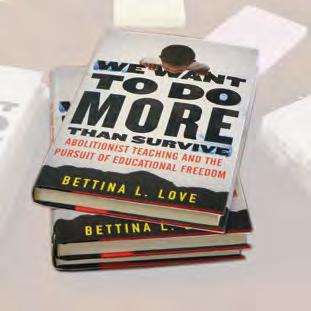Alumni News & Notes
School-wide Read Amplifies Alumna’s Fight for Justice in the Classroom The School of Education proudly selected alumna Bettina Love's book, "We Want to Do More than Survive: Abolitionist Teaching and the Pursuit of Educational Freedom," as its 2019-20 School-wide Read. In addition to reading the book, students, faculty, and staff members participated in a book discussion where they talked about important “It is important for subjects, like how educators to know how to combat racism in preK-12 education. deeply unjust systems Now a professor affect people and their at the University of Georgia's communities in unique Mary Frances ways, b ut Early College it is also imperative to of Education, Love earned her understand the bachelor's in liberal intersections of studies (2001) and master's injustice…for in elementary educators, this work education (2002) at the University of starts in the classroom, Pittsburgh. school, and school Leigh Patel, the associate dean of community.” equity and justice —Bettina Love from “We Want at Pitt Education, To Do More Than Survive” caught up with Love for an interview on the school's PittEd Podcast series. During the wide-ranging interview, they talked about why Love wrote the book, how teachers have reacted to it so far, and what lessons educators can draw from it. The excerpts have been edited for length and clarity.
To listen to the full interview, visit education.pitt.edu/podcast.
Patel: What S hould E ducators Take Away from the Book? Love: “I wanted to write a book where educators would see the beauty and the joy and the creativity of Black and Brown children. To be about that work of love and joy and humanity is to see us for who we are: the trendsetters, the innovators, the lovers, the people who find joy in some of the most hideous conditions. I just want folks to see us. I want you to read with that lens.” Patel: How D id t he Work of Abolitionists Inform and Inspire the Book? Love: “The idea of freedom-dreaming together is important. That’s why abolitionists were so important because they weren’t trying to reimagine. They were trying to destroy and rebuild something bigger and something more robust and something where everybody was included. That’s what I want people to take away: Black folks’ joy and the love and the idea that we have the intellectual capacity, the spiritual capacity, and the emotional capacity to redo this thing that we call education. It’s possible.” Patel: How Can Teachers Be Supported in Abolitionist Teaching? Love: “How do we start to put teachers’ wellness and their racial wellness ahead of everything else? To be an abolitionist is to be well, first and foremost. If we heal teachers, then the work of social justice is so much easier. This process of becoming well parallels the process of justice.”








